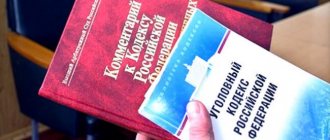Legal advice > Administrative law > What is the Criminal Code of the Russian Federation, what is it intended for, where and how does it operate: from and to
Numerous legislative acts regulate legal relations on the territory of Russia. Depending on the content and scope of action, their main functions are determined. Thus, the Criminal Code acts as the main regulator and main source of criminal law on the territory of the Russian Federation.
Any resident of our country has come across this legislative code in one way or another, but only a few can give it a full definition and explain its purpose. That is why our resource decided to consider the Criminal Code of the Russian Federation in more detail, devoting an entire article to it, which fully illuminates the essence, principles of action and the need for a legislative act.
Concept of criminal liability
The term “criminal liability” is used many times in various articles of the Criminal Code of the Russian Federation, in the titles of sections (section IV “Exemption from criminal liability and punishment”; section V “Criminal liability of minors”) and chapters (chapter 4 “Persons subject to criminal responsibility"; Chapter 14 "Peculiarities of criminal liability and punishment of minors") of the Code. However, the concept of criminal liability is not defined by law.
Criminal liability is a type of legal liability (along with civil, administrative, disciplinary and material).
Criminal liability as a category of criminal law is inextricably linked with crime. Criminal liability as a type of legal liability is the obligation to give an account specifically for a crime - a socially dangerous act committed guilty of guilt, prohibited by the Criminal Code of the Russian Federation under threat of punishment (Part 1 of Article 14 of the Criminal Code of the Russian Federation).
Criminal liability is the obligation provided by criminal law for a person who has committed a crime to bear responsibility for the crime committed and to suffer the negative consequences of his behavior imposed by the state in accordance with criminal law.
Other scientists the concept of criminal liability as a negative assessment of an act and the person who committed it on the part of society and the state, as well as the suffering of negative consequences by this person if a criminal penalty or other measures of a criminal legal nature are applied to him upon release from punishment. Moreover, in this context, release from punishment means release from punishment, release from serving a sentence and release from actually serving a sentence.
Purpose and history of the appearance of the Criminal Code of the Russian Federation
Criminal Code as a source and regulator of criminal law
The Criminal Code (CC) of the Russian Federation is the main source and regulator of criminal law in our country. This legislative act, recognized as normative, establishes the concept of a criminal act and the punishment for it in Russia.
Over the years, our state adopted similar legal acts, which were based on their principles of the rights and freedoms of citizens, which were considered fundamental for that period of time. The current Criminal Code was adopted more than 20 years ago. After the collapse of the USSR, the new government of the Russian Federation began to create its own legislative acts, which emphasized fundamentally new principles of the rights and freedoms of citizens.
As for the criminal sphere of legal relations, the first work on the creation of its source and regulator began in 1992. All projects were reviewed by the current government and were subject to some amendments. The Criminal Code of the Russian Federation was finally formed only in 1996, after which:
- On May 24, 1996, it was adopted by the State Duma;
- On June 5, 1996, it was approved by the Federation Council;
- It was signed by the President on June 13, 1996.
- On January 1, 1997, it entered into full legal force on the territory of the Russian Federation.
Since then, it is the Criminal Code of the Russian Federation that is the main source of criminal law, which defines all criminal acts on the territory of our country and the punishment for their implementation. There are no other regulators of criminal law in our country.
Basis of criminal liability
The law recognizes the commission of an act containing all the elements of a crime as the basis for criminal liability (Article 8 of the Criminal Code of the Russian Federation). In this definition, the legislator combines three concepts - act, crime and corpus delicti.
In the concept of crime given in Art. 14 of the Criminal Code of the Russian Federation, it is defined as an act that has signs of public danger, criminal wrongfulness, guilt and punishability.
Apart from the act, no other circumstances, such as the social status of a person, his origin, religion, nationality, etc., can serve as the basis for liability and give rise to criminal legal relations.
In determining the basis of criminal liability, the relationship between the concepts of a crime and the elements of a crime can be traced. In Art. 14 of the Criminal Code of the Russian Federation provides an abstract concept of a crime, defined as a socially dangerous act committed guilty of guilt, prohibited by the Criminal Code under threat of punishment. But crime does not exist in reality at all. There are specific crimes: murder, theft, robbery, etc. In order to establish whether a specific act is a crime, it is necessary to determine whether it (the act) contains the elements of any crime. Only in this case can the act be spoken of as a crime.
The corpus delicti is a set of objective and subjective characteristics provided for by criminal law that characterize a socially dangerous act as a crime. Its presence in a specific socially dangerous act serves as a necessary and sufficient basis for bringing to criminal responsibility the person who committed this act.
The norms of the Special Part of the Criminal Code of the Russian Federation describe the signs that reflect the specifics of a particular crime, and the norms of the General Part of the Criminal Code describe the signs that are characteristic of all crimes without exception.
The absence of at least one of the elements of a crime means its absence and, therefore, the absence of grounds for criminal liability. The commission of an act containing all the elements of a crime is the only and sufficient basis for criminal liability.
The composition of any crime is formed by four groups of signs, distinguished by its elements. An element of a crime is understood as a structural part of the composition, consisting of a group of signs corresponding to various aspects of the crime. There are four elements in total:
the object of the crime is the social relations protected by criminal law, which are encroached upon by the crime;
the objective side of the crime is the external manifestation of the crime in reality. It includes the following features: an act, socially dangerous consequences, a causal relationship between the act and its socially dangerous consequences, time, place, setting, method, instruments and means of committing a crime;
the subjective side of a crime is the mental activity of a person directly related to the commission of a crime. The content of the subjective side of the crime is characterized by such legal characteristics as guilt, motive and purpose;
the subject of a crime is a person who has committed a criminal act and, in accordance with the law, is capable of bearing criminal liability for it.
Criminal liability arises only for the crime committed. Acts that, although outwardly similar to crimes, are not crimes due to low social danger or its complete absence are not crimes and cannot serve as a basis for criminal liability. The criminal law includes such acts as causing harm during necessary defense (Article 37 of the Criminal Code of the Russian Federation), extreme necessity (Article 39 of the Criminal Code of the Russian Federation), reasonable risk (Article 41 of the Criminal Code of the Russian Federation), etc.
Code structure
The Criminal Code of the Russian Federation consists of two parts
As mentioned earlier, the Criminal Code of the Russian Federation has a codified structure, while maintaining internal unity and general intelligibility. The code consists of two main parts:
- General, which is divided into 6 sections, 17 chapters and 104 articles (from 1st to 104th). It defines the basic concepts that are in any way related to the regulation of criminal law on the territory of the Russian Federation.
- Special, subdivided into 6 sections, 19 chapters and 256 articles (from 105 to 361). It defines specific crimes for which criminal liability is imposed, their composition and the punishment for their commission.
- Both parts of the Criminal Code are integral and important in its composition, since they fully express the entire essence of criminal law in our country.
The first 104 articles of the Criminal Code of the Russian Federation, which form the general part of the code, contain such concepts as:
- criminal law, its essence and basic principles on the territory of Russia;
- crime, its categories and degree of responsibility;
- wine, its forms and types;
- punishment, its types, purposes and order of assignment;
- principles of exempting citizens from criminal punishment;
- other concepts related to criminal law relations.
As for the special part of the code, it specifies a certain type of crime, its composition and punishment. The largest information units of the Criminal Code of the Russian Federation are its articles. As a rule, they consist of several parts, which are introduced in order to clarify all the nuances of the criminal concept or crime under consideration. Each part is highlighted with an Arabic numeral.
Parts, in turn, can be divided into paragraphs, which serve for a more detailed analysis of the part in question and are designated by letters of the Russian alphabet. In addition to points and parts, the Criminal Code of the Russian Federation has such an information cell as a note. Such elements of the code reveal some concepts of criminal legal relations and formulate the type of criminal legal institution considered in a specific article.
In the Criminal Code of the Russian Federation, the hierarchy is represented by continuous numbering of each cluster of the act (sections, chapters, articles). The inclusion of new articles and chapters or, conversely, their exclusion does not change the existing numbering. When adding a new cluster between several old ones, the numbering continues in the same order, but with indexing. For example, an added article between 234 and 235 will receive the number “234.1”. If an article or chapter is excluded from the code, then a corresponding notice is placed in its old place.
Forms of implementation of criminal liability
The criminal law provides for several forms of implementation of criminal liability:
1) imposing a sentence to be served by the convicted person is the most common form of implementation of criminal liability. If a person is found guilty of committing a crime, he is given a guilty verdict, which imposes a punishment determined by a specific period and amount, which is a measure of state coercion and contains a restriction of his rights and freedoms. From the day the court's conviction comes into force until the criminal record is expunged or removed, a person convicted of committing a crime is considered to have been convicted (Article 86 of the Criminal Code of the Russian Federation). As follows from Part 6 of Art. 86 of the Criminal Code of the Russian Federation, only expungement or removal of a criminal record cancels all legal consequences associated with a criminal record provided for by the Criminal Code of the Russian Federation. The termination of a criminal legal relationship also means the termination of criminal liability.
2) assignment of punishment with exemption from serving it . The court may find a person guilty of committing a crime, sentence him, but release him from actually serving it. This form of implementation of criminal liability is:
- suspended sentence (Article 73 of the Criminal Code of the Russian Federation);
- exemption from punishment due to illness (Article 81 of the Criminal Code of the Russian Federation);
- release from serving a sentence upon expiration of the period of deferment of serving the sentence (Part 3 of Article 82 of the Criminal Code of the Russian Federation);
- release from serving a sentence upon expiration of the deferment of serving a sentence for drug addicts (Part 3 of Article 82.1 of the Criminal Code of the Russian Federation);
- exemption from serving a sentence due to the expiration of the statute of limitations for a court conviction (Article 83 of the Criminal Code of the Russian Federation);
- amnesty (Article 84 of the Criminal Code of the Russian Federation).
When applying these measures, the implementation of criminal liability consists of issuing a conviction, which reflects a negative assessment of the committed act on the part of the state, censure of the person who committed this act and the imposition of a punishment, which, on the grounds specified in the law, is not actually served. Termination of a criminal legal relationship and, therefore, criminal liability is associated with the timing of expungement or expungement of a criminal record, which depends on the type of measure applied. Thus, a person who has been given a conditional sentence (Article 73 of the Criminal Code of the Russian Federation) is considered to have no criminal record after the expiration of the probationary period (clause “a”, Part 3 of Article 86 of the Criminal Code of the Russian Federation). Persons released from punishment are considered to have no criminal record (Part 2 of Article 86 of the Criminal Code of the Russian Federation). Thus, a person released from serving a sentence due to the expiration of the statute of limitations for a court conviction is considered not to have been convicted after the expiration of the statute of limitations.
3) conviction of a person without imposing punishment . The court, having found a person guilty of committing a crime, makes a guilty verdict without imposing punishment. The implementation of criminal liability in this case consists of issuing a conviction, reflecting a negative assessment by the state of the committed act and censure of the person who committed it. In this form, the implementation of criminal liability occurs upon release from punishment due to a change in the situation (Article 80.1 of the Criminal Code of the Russian Federation), as well as release from punishment of minors (Article 92 of the Criminal Code of the Russian Federation). Criminal legal relations and criminal liability cease with the court's verdict of guilty.
The real principle of operation of the Criminal Code of the Russian Federation (the principle of protecting the operation of criminal law in space)
The real principle is to extend the jurisdiction of the criminal law of the Russian Federation to cases where harm is caused to its interests, regardless of the fact that the crime was committed outside Russia.
The real principle (the principle of protecting the operation of criminal law in space) is enshrined in Part 3 of Art. 12 of the Criminal Code of the Russian Federation. To apply it, it is necessary that the crime was committed by a foreign person or a stateless person not permanently residing in the Russian Federation.
A foreign citizen is an individual who is not a citizen of the Russian Federation and has evidence of citizenship of a foreign state.
A stateless person who does not permanently reside in Russia is an individual who is not a citizen of the Russian Federation and does not have evidence of citizenship of a foreign state who does not have a residence permit in the Russian Federation.
These persons are subject to criminal liability under the Criminal Code of the Russian Federation if:
- are brought to justice on the territory of the Russian Federation;
- the crime was committed on the territory of a foreign state, for which a sentence has not been passed in a foreign state;
- the crime was directed against a citizen of the Russian Federation, a stateless person permanently residing in the Russian Federation, or against the interests of the Russian Federation. These formulations of the law do not have a clear substantive understanding in the science of criminal law and are not presented systematically in judicial practice.
Compulsory measures used as exemption from criminal liability
Separately, it is necessary to highlight educational measures applied to minors (Article 91 of the Criminal Code of the Russian Federation), as well as other measures of a criminal legal nature (Section IV of the Criminal Code of the Russian Federation), which include compulsory medical measures, confiscation of property and a judicial fine.
Compulsory educational measures have a dual legal nature: they can be used as a type of exemption from criminal liability (Article 90 of the Criminal Code of the Russian Federation) and a type of exemption from punishment (Article 92 of the Criminal Code of the Russian Federation). The use of compulsory measures of educational influence as an exemption from criminal liability, as a general rule, means the absence of implementation of criminal liability - a refusal to implement it at the will of the state.
Compulsory measures of a medical nature , although they are coercive in nature, do not in themselves constitute the implementation of criminal liability, since they are used to cure persons suffering from mental disorders or improve their mental state.
Confiscation of property as another measure of a criminal law nature is enshrined in Chapter. 15.1 of the Criminal Code of the Russian Federation. It is not a coercive measure addressed to the person who committed the crime. Confiscation in the sense of Art. 104.1 of the Criminal Code of the Russian Federation - determining the fate of property associated with a crime.
A judicial fine (Article 104.4 of the Criminal Code of the Russian Federation) acts as a type of exemption from criminal liability (Article 76.2 of the Criminal Code of the Russian Federation) and as such represents the absence of implementation of criminal liability - the state’s refusal to implement it.
Principle of citizenship
In Part 1 of Art. 12 of the Criminal Code of the Russian Federation enshrines the principle of citizenship , according to which citizens of the Russian Federation and stateless persons permanently residing in the Russian Federation bear criminal liability under the Criminal Code of the Russian Federation even if they committed a crime outside the borders of the Russian Federation.
The principle of citizenship is also called the personal or national principle.
The principle of citizenship comes into effect if the following conditions are met:
- committing a crime on the territory of a foreign state;
- committing a crime against interests protected by the Criminal Code of the Russian Federation;
- the act is recognized as a crime under the Criminal Code of the Russian Federation, and it is not necessary that it be criminal under the criminal law of the place where the crime was committed;
- in relation to these persons there is no decision of a court of a foreign state regarding this crime.
Within the meaning of Part 1 of Art. 12 of the Criminal Code of the Russian Federation if a citizen of the Russian Federation or a stateless person permanently residing in Russia outside the Russian Federation committed an act that:
- is recognized as a crime according to the law of the place where the act was committed, but is not recognized as a crime according to the Criminal Code of the Russian Federation, they may be subject to liability under the criminal law of the place where the crime was committed if they are brought to justice on the territory of a foreign state;
- is recognized as a crime according to the law of the place where the act was committed and according to the Criminal Code of the Russian Federation, they are subject to liability under the Criminal Code of the Russian Federation;
- is not recognized as a crime according to the law of the place where the act was committed, but is recognized as a crime according to the Criminal Code of the Russian Federation, they are subject to liability under the Criminal Code of the Russian Federation.
For a long time. Expensive. It doesn't hurt.
Representation in criminal proceedings
An important guarantee of ensuring the legitimate interests of an individual is the right of everyone to receive qualified legal assistance, first enshrined in Art.
48 of the Constitution of the Russian Federation. The purpose and role of this constitutional provision is so large-scale that to date some of its aspects in criminal proceedings remain unrealized. One of the unresolved problems is the uncertainty of the status of a lawyer providing legal assistance to a witness and other persons not related to the prosecution and defense. According to Art. 6 of the Federal Law “On Advocacy and the Bar in the Russian Federation” (hereinafter referred to as the Law on the Bar), a lawyer in criminal proceedings participates in two capacities: a defender and a representative. In criminal proceedings, these concepts are filled with their own content.
The term “protection” is used in two meanings: broad (general legal) and narrow (sectoral). In the first sense, protection is the defense of the rights, freedoms and legitimate interests of any person, regardless of his legal status. Such protection is stated, for example, in Art. 46 of the Constitution of the Russian Federation: “Everyone is guaranteed judicial protection of his rights and freedoms.” In this regard, we can say that any person has the right to defense, and his lawyer in all cases is the defender of his client: the accused, the victim, the witness, etc. This idea of a lawyer is common in everyday consciousness. For the average person, a lawyer is always a defender.
However, in criminal proceedings, the terms “defense” and “defender” are used in a different, narrow sense, since they are associated with only one subject - the criminally prosecuted person (suspect, accused). In this case, the concept of “defense” appears as the antithesis of criminal prosecution and consists in the opposition of the suspect, the accused and his defense attorney to the thesis of suspicion or accusation by all means and methods not prohibited by law. It is in this sense that the concepts of “defense” and “defender” are used in the norms of the Code of Criminal Procedure of the Russian Federation (Articles 15, 16, 46, 47, 49 - 53, etc.).
A lawyer who acts in criminal proceedings in the second status of a representative also has its own specifics. According to Art. 45, 55 of the Code of Criminal Procedure of the Russian Federation, only four participants have the right to a representative (not to be confused with a legal representative): the victim, the civil plaintiff, the civil defendant and the private prosecutor. These subjects can exercise their rights personally, or they can transfer them to another person - a representative who, in essence, acts as a deputy principal. Therefore, the representative is vested with the same powers that the represented person has (part 3 of article 45, part 2 of article 55 of the Code of Criminal Procedure of the Russian Federation).
It is easy to see that defense and representation refer to those participants in the criminal process who defend their legal interest in the case, i.e. are parties to a legal dispute or litigation. A criminal case directly affects the interests of the accused, victim, civil plaintiff, defendant, and private prosecutor. To defend their interests, each of these subjects must act actively and purposefully. For this purpose, these persons are endowed with a wide range of powers (Articles 46, 47, 42, 43, 44, 54 of the Code of Criminal Procedure of the Russian Federation), the successful implementation of which most often requires qualified legal assistance from a lawyer.
Along with the subjects defending their legal interest in the case, many other persons are involved in criminal procedural activities: witness, applicant, person giving explanations, mortgagor, guarantor, translator, etc. According to Art. 48 of the Constitution of the Russian Federation, all of them belong to the category “everyone” and, therefore, have the right to receive qualified legal assistance. Of course, these participants in specific criminal procedural situations, as a rule, do not experience any particular difficulties and therefore do not resort to the help of a lawyer, but they do have this right.
The Code of Criminal Procedure of the Russian Federation names exclusively a lawyer as a person providing legal assistance to subjects of this category. In the Code it is mentioned in relation to three participants: a witness (clause 6, part 4, article 56, part 5, article 189), a person whose premises are being searched (part 4, article 182), and from March 4, 2013 g. - to persons participating in the stage of initiating a criminal case (Part 1.1 of Article 144).
Since in the group of subjects under consideration, the witness is primarily named - one of the most common participants in criminal proceedings, the witness’s lawyer began to appear in the legal literature along with the usual statuses of a lawyer-defender and a lawyer-representative. At the same time, the question arose about the procedural position of the witness's lawyer.
Most lawyers who touch upon this problem proceed from the fact that, since according to the Law on Advocacy, a lawyer acts in two capacities: a defender and a representative, then the witness’s lawyer is one of them, because there is no third option.
Almost none of the authors calls the witness's lawyer a defender, since the latter's activities clearly relate only to the criminally prosecuted person.
Many proceduralists consider the witness's lawyer to be his representative. Some of them do not argue their position based on the logic: “If the witness’s lawyer is not a defender, then he is a representative” <1>. Others analyze representation in criminal proceedings and argue that the witness's lawyer and the victim's lawyer have equal powers and perform the same function. Character code: predstavitelstvo-v-ugolovnom-protsesse Tags: representation in criminal proceedings Number of views: 4795 Date of creation: 12/29 .2016 20:30:39 Lawyer: Oleg Vladimirovich Stuchilin







